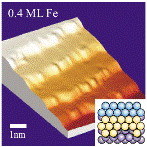Department of Physics and Astronomy: Publications and Other Research

Axel Enders Publications
Document Type
Article
Date of this Version
10-2011
Citation
Langmuir 27 (2011), pp. 14267–14271; doi: 10.1021/la203389d
Abstract
The nucleation and growth of 2D layers of tetraphenyl porphyrin molecules on Ag(111) are studied with variable-temperature scanning tunneling microscopy. The organic/metal heteroepitaxy occurs by strict analogy to established principles for metal heteroepitaxy. A hierarchy of energy barriers for diffusion on terraces and along edges and around corners of adislands is established. The temperature is key to activating these barriers selectively, thus determining the shape of the organic aggregates, from a fractal shape at lower temperatures to a compact shape at higher temperatures. The energy barriers for the terrace diffusion of porpyrins and the molecule-molecule binding energy were determined to be 30 meV < Eterrace < 60 and 130 meV < Ediss < 160 meV, respectively, from measurements of island sizes as a function of temperature. This study provides an experimental verification of the validity of current models of epitaxy for the heteroepitaxy of organics and is thus expected to help establish design principles for complex metal-organic hybrid structures.


Comments
This article is a U.S. government work, and is not subject to copyright in the United States.